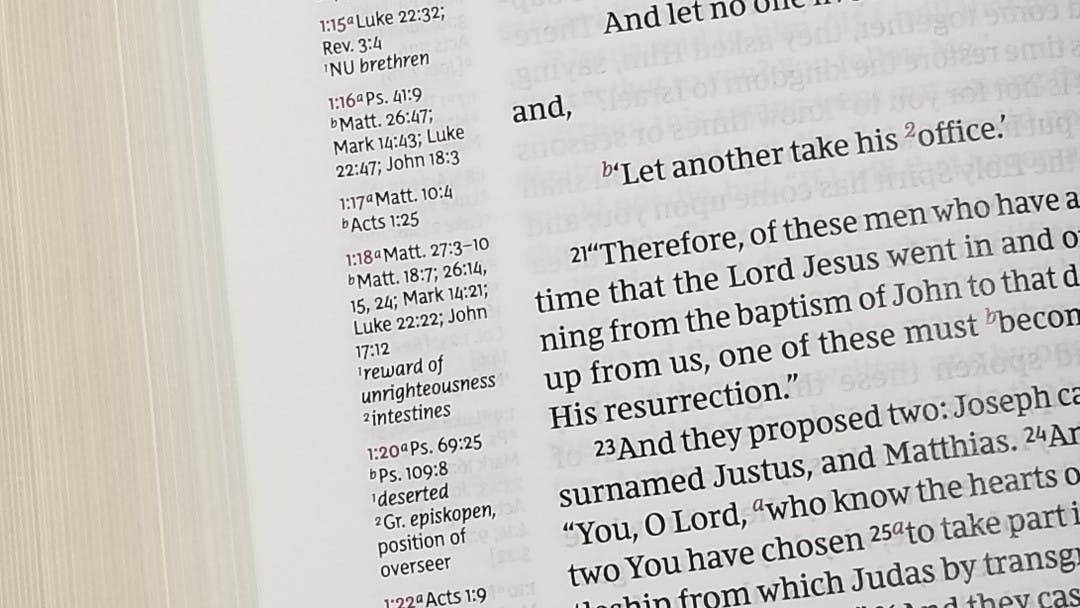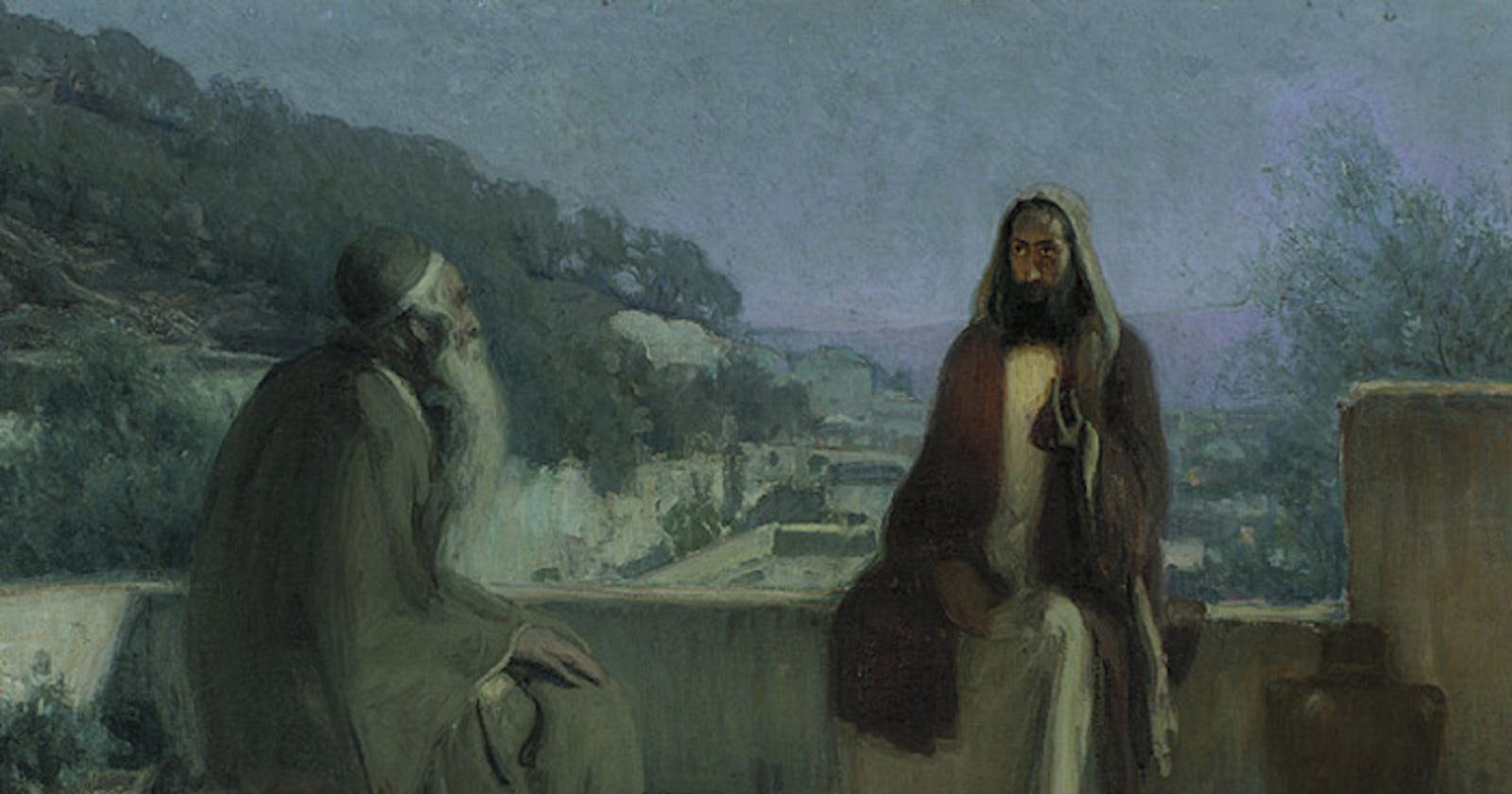John 3 Commentary
What makes a text such as the bible rich in beauty and relevance?
It is the same reason why Wikipedia is so well-received and has grown to such high popularity. So popular and so well used that it is the established website for facts, history and knowledge. Wikipedia, unlike other websites and news articles which are trying to keep up, has blue text, also known as hyperlinks. Hyperlinks, in a historical and scientific setting, are gateways to more information, more content and more stories.
The Bible, unbeknownst to many readers, is also a hyperlinked text. As a theological text, however, the hyperlink in any given passage is inferred by the reader, based on his experience, his knowledge of previous passages and his understanding of the story at large.
Hyperlinks are also better understood today in films as refrains, reflections, flashbacks and flashforwards, enhancing the story and abstracting memories, themes and emotions. In fact, I suspect the success of Western films and Western fiction historically can be sourced directly from the writings and structures of the biblical texts since the Bible is technically the first book and for almost thousands of years, there was only one surviving book across Western civilisations.

Chris Harrison, Bible Cross-References
I love this image.
It visually explains exactly what I’m talking about. The King James Bible includes cross-references to other passages in the margins of every page. These are conceptual links between verses, connecting locations, people and phrases. There are 7,342 margin notes in the 1611 King James Bible, and over the years, cross-references have been added to these margins to conceptually connect the biblical themes. These cross-references are merely guides to the themes and memories that were already there.

Cross references are conceptual links between verses, connecting locations, people, phrases, etc. found in different parts of the Bible. Cross-references are included in the margins or footnotes of some Bibles
The Quran does something similar, mentioning pieces from the Old and New Testament, but does not compile these texts into a hyperlinked narrative but rather excludes them, mainly due to the incoherence between both Judeo-Christian texts and Islamic texts. The Quran also doesn’t have a hyperlinked nature, also due to the directionality and nature of Arabic, which also may be the reason why there is a focus on enhancing the text by singing it. The ancient Arabs used songs and passages to monitor how far they had travelled across the desert, thus hyperlinking such a text would cause much confusion.
I believe that the hyperlinked nature was naturally abstracted from the Bible over generations of additions and compilations. These ancient texts weren’t authorised by a corrupt and powerful council, nor was it given to just a few powerful people. The task was taken up by monks, priests and humble religious workers who found meaning and value in contending with one of the most conceptually powerful pieces of writing ever created, one which includes transcendent mystery and raises the foundations of one’s conceptual understanding of the world.
The Bible, unlike the Quran, is read in pieces and as a whole. Its pieces reference to other pieces and those pieces culminate into what we know to be a story. But it isn’t just any old story—anyone can write that “Tim went to the shops, Tim bought a packet of crisps, Tim died.” This story is the story of mankind, of the individual, the trials and adventures we undertake and the beckoning of a spirit to conquer evil and be the Good in the world.
So let’s begin —or dive in I should say.
There was a man of the Pharisees, named Nicodemus, a ruler of the Jews; The same came to Jesus by night, and said unto Him, Rabbi, we know that Thou art a teacher come from God*; for no man can do these miracles that Thou doest, except* God be with him.
(John 3:1-2)
Nicodemus, a Jewish leader, does not want to be seen with Jesus and so comes to him at night. As a leader, he understands that being in association with someone such as Jesus will be of tremendous risk to his community and his leadership. He addresses Jesus as Rabbi, as a form of respect and admiration. At this point, Jesus had performed many miracles, some edging towards the supernatural —which is beyond my understanding and which I don’t wish to consider physically valid. However, he presents all the attributes: turning order into chaos, bravely wrestling with evil, having perspectives and understanding around many directions and being able to speak words of power and magic. In other words, he came from God. He is sourced from the divine and embodies the spirit of Yahweh, God of the Jews —encapsulating all the spirits that God comes to Adam, Noah, Abraham, Moses, and all the other prophets of the Jews.
Jesus answered, and said unto him, Verily, verily, I say unto thee, Except a man be born again, he cannot see the kingdom of God*.*
(John 3:3)
Jesus speaks about rebirth. In a planer context, one could attribute this to simply being baptised or becoming a Christian. However, this means much more than that. ‘The kingdom of God’, although seen as paradise in the clouds or a place you go when you die, has no utility when treated so,—except perhaps when you are on your deathbed. Many of us will be living on our deathbeds if we treat the kingdom of God as a place that we enter once we die. If you are reading this now, you are likely not about to die but rather have a whole life ahead of you. Up until now, you’ve equipped yourself with many tools: a skill, a language, a network, and money. Some tools are more challenging to grasp, such as conceptual laws such as the value of the individual, presumed innocence, self-evident human rights and freedom of thought (all of which also stem directly from Biblical narratives). ‘The kingdom of God’ is another conceptual tool. If a utopian state does exist, we aim towards that without ever acknowledging that you’ve ever reached it. We do not reduce the mystery of God to conceptually earthly grounds, as seen by the Communists, by the Nazis and by the fundamental Islamic groups; rather, we aim at an idea, a ‘kingdom of God’, and adjust our being towards that.
What is your ideal? A loving family? A stronger friendship? A prosperous career? A meaningful and mature relationship? Whatever you want, truthfully, is within that state of being. How do you know you’ve arrived at the ‘kingdom of God’? You don’t. You never reach that state because if you did, you would descend into tyranny, you would be bored and you would want something to happen, perhaps you would even break something yourself so that something exciting would take place. As you traverse this Earth, along a winding and ever-changing path, you are led by the stars above, or a cloud in the sky, blowing and twisting in the wind.
Why should you aim at something which is constantly moving in front of you? Are you no more than a donkey led by a carrot on a string? If you aim at something else and you arrive there, what would be next? Let’s say you got your carrot and ate it, where do you go from there? You can’t just stay in the same place, state of mind and state of self-tyranny. You have to go out and find more carrots to chase.
Nicodemus saith unto Him, How can a man be born when he is old? Can he enter the second time into his mother's womb, and be born?
(John 3:4)
Nicodemus, being what we could describe today as a reductionist (or fundamentalist), is confused by Jesus’s claim. Today, I’m always stunned by the stark criticisms of religion, mainly the reductionist's perspective and reading everything from the Bible from a literal and objective view of the world. The Bible, like all theological texts, is not a historical record (although it does transition by being shaped by history) nor is it a scientific document. In fact, it’s rather challenging to be a scientist or a historian, both of which are not in their prime to explain things related to the transcendent, but rather the objective.
As a consequence, many religious leaders today are performing mental gymnastics to accommodate this reductionist perspective. I recall the Church of Scotland urging that “God is genderless”, in light of the Transsexual Movement, and another Baptist minister highlighting that dark energy is evidence of God “intricately designing the universe”.

'Some Women Have Penises': Church of Scotland Launches Transgender Support Guide [1]

Neil deGrasse Tyson on Science, Religion and the Universe | Moyers & Company [2]
This is where many Christians, many Muslims and many people of faith fall into. Nicodemus doesn’t have an ulterior motive to undermine Jesus’s teachings or his words, he is genuinely confused as a Jew who has acquired an object-oriented theology and is applying it to Jesus’ words. As a mirror which reflects what it is facing, so to does the answer reflect the question. If the answer only focuses on the question (as it reduces the theology), then the answer will inevitably follow and also undermine the teachings and spirit of the text. However, Jesus does not reflect on the question and undermine himself.
Jesus answered, Verily, verily, I say unto thee, Except a man be born of water and of the Spirit, he cannot enter into the kingdom of God*.*
(John 3:5)
Jesus expands his meaning of being ‘born again’: a man be born of water and of the Spirit. This is a reference to the ritual of being baptised. Baptism is a symbolic representation of being cleaned, of having your sins washed away and purified.
That which is born of the flesh is flesh, and that which is born of the Spirit is spirit. Marvel not that I said unto thee, Ye must be born again.
(John 3:6-7)
I think about the objects of our body which we have inherited from our parents. Technically speaking, your parents are a reflection of you and you contain the genetics of both of them. Yet that is merely the body and the objects: the face, the hair, the eyes, the body structure. However, you are actually not just a product of your parents but also a product of your nurture, across time and across your culture. Meaning that your genetics and your flesh are only a piece of you, and it also does not guarantee any entrance into ‘the kingdom of God’.
I should also mention that ‘born again’, in the Greek text, also translates to ‘born from above’, meaning to acquire the attributes of the divine Spirit, through renewal and rejuvenation is the only way to direct yourself, and thus enter into, the aforementioned ‘kingdom of God’.
What substance makes up the rest of you? If your flesh makes up one part, what makes up the other? Jesus mentions something called the Spirit and it’s the Spirit which saves one’s destitution left by the flesh. What is this so-called Spirit? The Spirit is the embodiment of God, it is the courage to go out into the unknown, and it is the bravery to battle evil. It turns chaos into order, it shows justice in one hand and mercy on the other. It is that which slays dragons, rescues virgins and collects gold to distribute it out to the community. It is that which rescues one’s father from the underworld and defeats tyranny. It is the all-seeing eye. It pays attention, it listens and it speaks words of wisdom.
The wind bloweth where it willeth {listeth}, and thou hearest the sound of it thereof, but canst not tell from whence it cometh, and where {whither} it goeth; so is every one that is born of the Spirit
(John 3:8)
The Spirit, as described before, is unknown to where it comes from. There is no genetic lineage, no bloodline, no special family or location. The Spirit comes to those after flying in the wind, unknown to where from, and unknown to where to.
Nicodemus answered, and said unto Him, How can these things be? Jesus answered and said unto him, Art thou a teacher {master} of Israel, and knowest not these things? Verily, verily, I say unto thee, We speak that which we do know, and testify that which we have seen; and ye receive not our witness.
(John 3:9-11)
You must understand just how much Jesus put the people of Israel in their place. Judea, as a state at that time, completely diverged from its original teachings and morals. They had forgotten their roots and forgotten the once-established Israel. They were ruled by the Romans and complied with their laws and their traditions. The traditional values and morals of the Jews descended away from Yahweh, so to speak, and the conscious religious thinking was in the hands of but a few priests, many of whom were complicit to the Romans and profited from their control. What was once a flourishing and rejuvenating state of Israel became a stagnant and undeveloped state of tyranny —where identity and separatism from the Romans conceived an ideology that the Jews, regardless of their practice, were still ‘God’s chosen people’.
There is something contentious about bringing the history and subject of Israel in front of Nicodemus. In our lives, we are called upon to adventure into the unknown by the encouragement and disappointment of our ancestors. As Jesus beckons the history of Israel, what comes forth also is the burden of the past onto the present. (For those who do not know, the Jews wondered across the desert in search of the Promised Land, and were led to by the same entity that Muslims as well as Christians call God) Our history, our broken and sorry history, looks at us in shame as we reflect on them in the mud and troubles we find ourselves in. Once we’ve perturbed a vision of what we might do, we then can lay out a future and venture into the unknown. Your heritage and your ancestry are an informer of your duty and responsibility when you are led astray. It is the Father that tells you to get the hell up. It is the wise last words of the dead. It is the voice of reason from afar. The ghost of Christmas past. It is the still and solemn gravestone. It is a reminder that you are not forever because they were not forever either. It is a reason for you being here because they were here before.
Jesus pushes further into the stories of Jewish traditions. Although the Bible is organised into mythological and chronological within verses, paragraphs, chapters and books, what I would further like to highlight again is the not-so-obvious hyperlinked nature of the Bible. That is, there are phrases, paragraphs and themes which are related to other phrases and paragraphs at other parts of the book. Since the story of Genesis was originally orally told by the emerging Jewish tribes, the book can be as old as 4,000 years. If read in fundamentally chronological order, what you have is a continuous series of hundreds of thousands of linked ideas and concepts in an array, culminating into a narrative. These hyperlinks were not arbitrarily created, they were identified over thousands of years and were first put into practice when the King James Bible was being formed. If a large set of refrains, reflections, flash-backs, and flash-forwards, emerges from a text, what you have is something akin to a living memory, a shared transcript across mankind, a neural and biological structure formed over generations over stories. This structure isn’t which can be fundamentally reduced, rather it is one which can represent something mysterious and true at the same time. Something which is both mysterious and true is no different to the entities, morals, and embodiments of God.
And where is Jesus, the so-called “Son of God”, where is his place in the continuum of the Jewish tradition?
And as Moses lifted up the serpent in the wilderness, even so must the Son of man be lifted up: That whosoever believeth in him should not perish, but have eternal life.
(John 3:14)
This links to the story of Moses and the bronze serpent staff. After escaping slavery in Egypt, the Israelites were wandering across the desert and quickly descended to worshipping idols. This made the God Yahweh angry and so he sent a horde of snakes to bite and kill the people. Being led by Moses, the people (naturally by being bitten by snakes) became upset and asked Moses to make a resolution with God. Moses spoke with Him and God said to Moses:
“Make thee a fiery serpent, and set it upon a pole: and it shall come to pass, that every one that is bitten, when he looketh upon it, shall live”
(Numbers 21:8)
Although wrapped in mystery and mythology, this story highlights a psychologically significant step in facing —and looking at— your deepest fears. In fact, it’s an almost obvious analogy to conquering your fears: look at what you are afraid of, see it for what it really is, and by doing so you may conquer it, and transcend your fear. Jesus points to this story because it’s a direct link to the fear which still perpetrated throughout Israel. It was not a fear of snakes, but rather a fear of death itself.
God, or Yahweh, appears as multiple spirits in the form of stories. In the story of Cain and Abel, God is the spirit which calls for you to make appropriate sacrifices and calls you out when you don’t —and try and escape that and see what happens. In the story of Noah, God is the spirit which calls for the wise to prepare in the face of crisis: you do that if you are wise and you do that if you care about the people around you. Abraham is ageing in his tent, and God is the spirit which calls the improper self-indulgence to get out and go into the terrible and catastrophic adventure of your life —and then they have to make the highest possible sacrifices (Abraham’s son) to achieve the highest possible goal. Furthermore, Moses is a mediator for Yahweh and the Israelites, and God appears as the spirit which allows you to let go of your tyrannical preconceptions of the world; however, once you let go, you end up mindless and starving in the desert (which is why many people will look back at the past and view it as “the good old days” when really you were a slave to someone or something). At least you had a ground to walk on and a roof over your head, at least in the tyranny, you knew who you were.
God appears as many spirits throughout the Jewish myths and He does so by beckoning forth the courage and bravery and goodness in people. If we fast-forward to the coming of Jesus, God, the same spirit as before only this time he comes to a resolution for something. This resolution is what connects the Old Testament to the New Testament more than any books of the Torah connect to each other. It is this resolution which brought forth the fundamental humanity in billions of people across the world. It is this resolution which became the greatest discovery of the human condition ever created. It is this resolution which triggered Western civilisation to pursue beauty in both the arts and the sciences. God appears as the spirit which says to the whole of mankind to bear the tragedy of your life.
That is the Spirit which guides every biblical character, from Adam to Abraham, to Moses to Job and to Jesus. That is the spirit which yields unbelievable power. That is the spirit which guides us the to highest possible place. You can bear the burden of your life. You can carry the cross, as heavy as it is, you can bear it.
What is Jesus referring to when he speaks of Moses and the bronze image of the serpent? Visit any catholic church, and look at the people sitting in the pews. Maybe they’re on their knees facing something they care about (you know they care about something when they’re on their bloody knees). Look at what is at the front: an image of Jesus on the cross. Stare at it, and you might just understand. Just as the Israelites transcended their fears and lived by looking at the bronze serpent, so do the people who look at Jesus on the cross, thus bearing the terror of death and bearing the burden of your life, thereby transcending it.

Nottingham Cathedral
I don’t know if there is anything to add or discover in regard to the human condition. It has begun to slowly emerge to me that Jesus Christ was the last element in our pursuit to establish the fundamentals of the human condition and its spirit. Although I do believe that the true historical account of Jesus is wrapped up in blankets and layers of mythology, that fact cannot simply undermine what is happening to how humanity is reflecting on the human condition. Jesus Christ, in all his representations and mystery, is a hallmark discovery of human nature and how to pursue meaning. That fact doesn’t have to be routed in fundamentalist history nor do we have to perform mental gymnastics to accommodate other ideologies (including religious fundamentalism). It is self-evident that Jesus died on the Cross, just as human rights and presumed innocence are also self-evident, to transcend suffering one must bear it. It’s almost too obvious to be true. It’s too simple that it has to be true.
An argument developed between some of John’s disciples and a certain Jew over the matter of ceremonial washing. They came to John and said to him, “Rabbi, that man who was with you on the other side of the Jordan—the one you testified about—look, he is baptizing, and everyone is going to him.” To this John replied, “A person can receive only what is given them from heaven. You yourselves can testify that I said, ‘I am not the Messiah but am sent ahead of him.’ The bride belongs to the bridegroom. The friend who attends the bridegroom waits and listens for him, and is full of joy when he hears the bridegroom’s voice. That joy is mine, and it is now complete. He must become greater; I must become less.” The one who comes from above is above all; the one who is from the earth belongs to the earth, and speaks as one from the earth. The one who comes from heaven is above all.
(John 3:25)
This may not seem obvious at first, but this is a stark contrast between the contentions in the story of Cain and Abel. Cain's jealousy towards his brother Abel led him to commit the first murder, an act that ruptured their relationship and resulted in Abel's death. Cain's actions were driven by his own desires, pride, and a refusal to acknowledge his brother's worth. This act of violence and jealousy created a deep rift between them.

Saint John the Baptist Preaching in the Wilderness, Anton Raphael Mengs
However, John exhumes a different approach. Just as Cain was the firstborn before Abel, John the Baptist arrived before Jesus. He is depicted as a humble and selfless figure, whose primary role was to prepare the way for the coming of Jesus Christ. He recognized Jesus as the Messiah and testified to his authority and divine nature. However, as Jesus gained popularity and began baptizing people, some of John's disciples became concerned and jealous, as they saw people flocking to Jesus instead of John.
When John's disciples expressed their concern, John responded with humility and a sense of reconciliation. He acknowledged that his purpose was to pave the way for Jesus and that Jesus must become greater while he, John, must become less. By doing so, John demonstrated a willingness to let go of his own influence and popularity for the sake of the greater purpose that Jesus was fulfilling.
This attitude of humility and selflessness contrasts with the jealousy and violence displayed by Cain. While Cain sought to dominate and destroy his brother, John embraced his role as the precursor to Jesus, recognizing that his purpose was to point others towards the true Messiah.
In this sense, John's actions can be seen as a reconciliation to the destructive actions of Cain. Instead of succumbing to jealousy and potentially harming Jesus or obstructing his mission, John willingly stepped aside and allowed Jesus to take centre stage. John's humility and acceptance of his role in the divine plan played a crucial part in the unfolding of Jesus' ministry.
Overall, the comparison between John the Baptist and Cain's jealousy against Abel highlights the contrast between destructive jealousy and humble acceptance. John's actions serve as an example of how one can overcome jealousy and embrace a reconciliatory approach. John is a redemption for the sins of the past, the sins of our ancestors and the sins of the beginnings.
The beauty and relevance of a text such as the Bible lie in its rich interconnectedness, much like the hyperlinks we find in modern digital platforms. The Bible, as a theological text, is a hyperlinked narrative where the reader infers the connections between passages based on their own experiences and understanding of the larger story. This intricate web of intertextuality adds depth and meaning to the biblical text, making it a captivating and profound piece of literature.
Just as hyperlinks in films enhance the storytelling experience, the Bible's interconnectedness has influenced Western films and fiction throughout history. The biblical texts serve as a foundation for storytelling, providing themes, memories, and emotions that resonate with mankind. John 3 is just a knot in the endless web that incorporates this text, but it is something to be marvelled at.
The Bible is not just any ordinary story; it is the story of mankind, the individual, and the challenges and adventures they undertake. It calls upon the reader to confront and conquer evil, embodying the spirit of being the force of good in the world. Each passage, like the one about Nicodemus, carries profound meaning and symbolism. Nicodemus, a Jewish leader, approaches Jesus at night to avoid the risk to his community and leadership. Their dialogue about being "born again" goes beyond a literal interpretation. It speaks to the idea of continual renewal and the pursuit of a higher state of being, symbolized by the "kingdom of God."
The Bible challenges reductionist perspectives that seek to interpret it solely as a historical or scientific document. It transcends such categorizations, delving into the realm of the transcendent and the abstract. The Bible, like any theological text, requires a nuanced understanding that goes beyond objective analysis. It speaks to the human spirit, offering guidance, wisdom, and inspiration.
In the dialogue between Jesus and Nicodemus, we see the clash of perspectives. Jesus's teachings confront the complacency and deviation from the original values and morals of the Jewish community. The history of Israel becomes a burden and a call to action for Nicodemus and his people. Our own histories, too, inform our present and guide us towards the unknown. They remind us of our responsibility to learn from the past, to forge a better future, and to honour our heritage.
The beauty and relevance of the Bible lie in its ability to connect with people on a deeply personal and spiritual level. It speaks to the profound questions of human existence, offering guidance, solace, and a path towards a higher state of being. As we delve into the interconnected web of biblical narratives, we embark on a journey of self-discovery, transformation, and a pursuit of the divine. Allow wisdom to illuminate your life. Seek mystery where you avoid it. Speak truth to create magic in the world.
References
[1] https://virtueonline.org/some-women-have-penises-church-scotland-launches-transgender-support-guide
